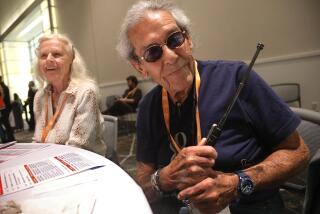A different kind of bad commute
- Share via
BAGHDAD — I was only trying to do what millions of Angelenos do every day: commute home from work.
But even when things are good here, they can quickly turn bad. First, I made the mistake of talking on my cellphone as my bus passed through an Iraqi army checkpoint. A soldier stopped the bus and ordered me to get off.
He threatened to detain me. I smiled and apologized, pleading forgiveness and explaining that I had received an urgent call. He let me get back on the bus, and my journey continued.
By the time we reached the terminal in central Baghdad where I catch my next bus, it was dark. A bonfire burned in the middle of the terminal, offering light and warmth. Vendors from the nearby outdoor fruit and vegetable market were tossing empty boxes into the flames to keep it burning.
The buses had all left, so I looked for a taxi. I spotted a driver, and asked if he would go to my neighborhood in northwest Baghdad. He agreed, so I got into the car and waited while he tried to round up more passengers to fill the seats -- kind of like a Baghdad Super Shuttle.
Three more people got in, and we set off.
He asked me where I wanted to be dropped off in my neighborhood. “The bus terminal,” I replied.
We hit heavy traffic near another Iraqi military checkpoint. Two flashy cars in front of us appeared to be trying to push ahead of each other in the sea of crawling vehicles. The driver of one opened his window and began yelling at the driver of the other. Things escalated, until both drivers had left their cars and were standing in the street screaming.
As they began to beat each other up, an Iraqi soldier ran over and began beating both of them. Other soldiers fired their guns into the air, adding to the tension. The drivers’ friends piled out of their respective vehicles and joined in the melee, shooting into the air and sparking a gun battle in the middle of the crowded street. I was terrified that I could be struck by stray bullets.
We managed to navigate our way out of the mess after a couple of minutes, nervous but unharmed.
The driver reached Adnan Square, not far from my neighborhood, but it was dark and deserted. Suddenly, he stopped and told me to get out. I objected, reminding him that he had promised to take me all the way to my neighborhood.
His face turned mean. “I did not say that. Get out here,” he said harshly.
I looked at the one other passenger still in the taxi, hoping he would help. But he said nothing and pretended not to hear what was going on.
I got out of the car and told the driver he had overcharged me. I spat out a phrase often used by Iraqis who feel they have been cheated, “I will not forgive you until Judgment Day.”
I walked away. The driver stepped out of the car, along with the passenger. Both began yelling insults at me.
“OK, beat me up,” I yelled at them, opening my jacket in a gesture of boldness: I had no weapon. I shouted that they were no better than common thugs.
One of them threatened to put me in the trunk, where kidnap victims are stashed before being killed. I kept walking as they screamed threats, my body shaking not from fear but from humiliation, and the realization of how vulnerable I was.
As I crossed the street, I remembered something about the passenger: He had been carrying a gun.
--
This report is one in a series of occasional first-person accounts of life in Baghdad by The Times’ Iraqi staff members.
More to Read
Sign up for Essential California
The most important California stories and recommendations in your inbox every morning.
You may occasionally receive promotional content from the Los Angeles Times.










